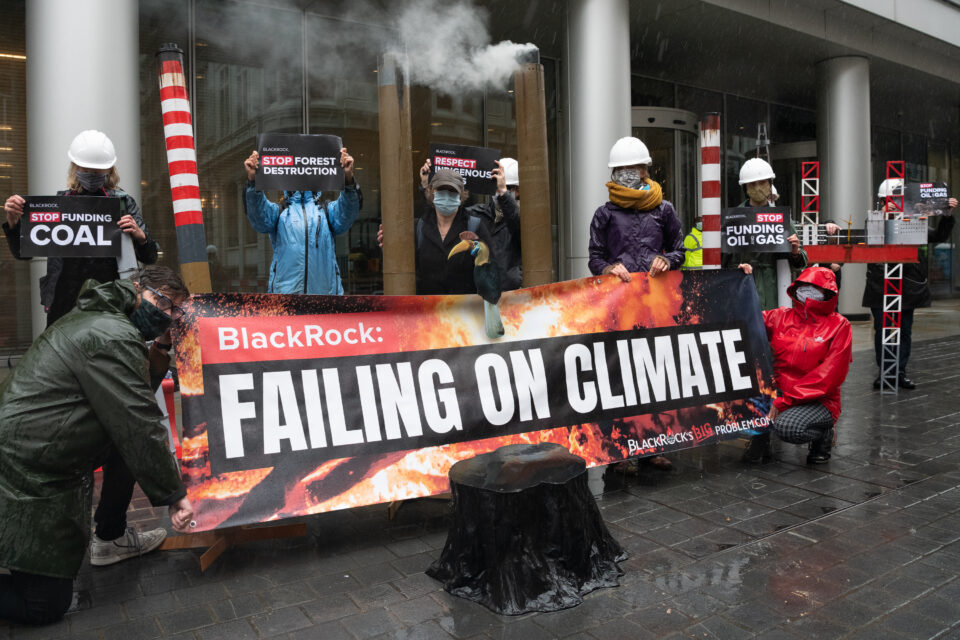
How an EU ‘taxonomy’ could stop billions of Euros being poured into fossil fuels
02-12-2020
Between 2016 and 2019, banks have invested $2.7 trillion into fossil fuel industries. Institutional investors and asset managers have put billions into companies that have little to no plans of stopping to emit CO2. It’s almost like the 2015 Paris Agreement never existed. How could this happen? The short answer: there is no law that forbids any financier to put its money into climate changing activities and companies.
There are investment products that are supposed to invest in a climate friendly and environmentally responsible way. But because there are no agreed-upon standards, the financial industry made up its own definitions. With ‘green washing’ as a consequence. Our climate and the environment do not actually benefit from ‘green’ index funds or the like.
What is the EU ‘taxonomy’?
To combat green washing, the EU issued a law that sets out how to define environmentally friendly activities according to six categories, the so-called ‘taxonomy’. The detailed definitions of two categories in this taxonomy are currently being discussed: activities that support, firstly, climate change mitigation and, secondly, climate change adaptation. For instance, activities such as growing non-perennial crops or livestock production (as part of the agriculture and forestry sector) have to be defined as either mitigating climate change or adapting to it. They also need to fulfill many conditions, including scientific criteria.
The technical details of these definitions are currently being fought over. Neither the fossil fuel industry nor the financial sector want strict requirements (more in an upcoming report by Reclaim Finance and Change Finance). But many voices from civil society worry that the definitions themselves might result in green washing, for example if financing of gas will be included. The EC has published on 20 November the draft detailed definitions for public consultation and has to take a final decision before 31 December.
The fight for clean definitions will continue in 2021 when four additional ‘green taxonomy‘ categories need to be defined in detail:
- sustainable use and protection of water and marine resources
- transition to a circular economy
- pollution prevention and control
- protection and restoration of biodiversity and ecosystems, including forests
Who is involved in defining the taxonomy?
A stakeholder ‘Platform on Sustainable Finance’ has been created to help the European Commission propose detailed definitions. However, many members of this platform are from the fossil fuel sector themselves. Civil society organisations and academics are present – but the group is clearly skewed towards industry representatives. Official European Agencies have a seat on the table, too (e.g. financial supervisory authorities, European investment banks and environmental bodies). Moreover, the EU member states also have their own advisory committee adding their voice before the Commission decides. The national governments do not publicly disclose what they are telling the Commission, but they often defend their national (fossil fuel) industries.
Who has to use the taxonomy?
Notwithstanding all the fuss about defining what is ‘green’ and what is not, no private investor, investment product or bank is actually compelled to use the taxonomy when it is financing any sort of company or activity. That in itself is problematic, because only when an investor adheres to the strict EU taxonomy standards, it can be trusted to be climate friendly. Other investment products can simply report to not adhere to the taxonomy definitions, or only disclose to what percentage they do. A new reporting obligation is incorporated in the law, however. From June 2021 on wards, large companies, investors and banks have to publicly declare whether or not and how they use the taxonomy.[1]

Protest at BlackRock HQ in London, UK, 2 October 2020
Why is BlackRock against an EU taxonomy?
Campaigners are scrutinising and putting pressure on big investment managers, like BlackRock, to stop them channeling huge investments to the fossil fuel industry. BlackRock itself has been fiercely lobbying against an EU taxonomy. BlackRock manages global assets worth more than US$ 7 trillion and does not want strict definitions — so it can claim to be green without actually doing good for our planet. More importantly, without strict definitions, it would not have to divest from fossil fuels. BlackRock could simply choose what it considers harmful and not profitable, which might differ greatly from what is required to stay within our planetary boundaries.
What is still missing?
This still leaves us with a big blind spot. There is no definition which activities are harmful for the climate and the environment. According to the taxonomy law, this definition of harmful activities[2] will be proposed at the end of 2021. The financial industry has already openly opposed such a category in their responses to a recent EU consultation. In contrast, civil society, financial authorities and even the European Central Bank have responded that they are in favour of a category that defines activities harming our planet.
What’s happening next?
Our planetary carbon budget will be exhausted in seven years, which means that we urgently need to answer some questions: until when will the financing of harmful activities be phased out and banned, so that we can achieve the Paris climate targets and stay below 1.5°C warming? When will the taxonomy definitions also protect people? And how can we promote and integrate the UN Sustainable Development Goals within the EU taxonomy?
The European Commission should give an answer to these questions beginning 2021, when it will publish its renewed sustainable finance strategy. What can civil society do until then to promote ambitious EC proposals? Let your colleagues and members know that an ambitious strategy is needed, one that effectively prevents further financing of fossil fuels. And get ready for next year to put pressure on the Commission, the European Parliament and your own Finance Minister. They need to decide on laws that will effectively move trillions of dollars to a carbon free and just transition of the economy and society.
Author: Myriam Vander Stichele, Senior Researcher at SOMO, in collaboration with the Change Finance working group on sustainability. Read her new EU Taxonomy Fact Sheet.
Notes:
[1] Art. 8 of Taxonomy Regulation.
[2] This category has often been referred to as so-called “brown taxonomy”. However, we decided not to use such terms for the racial prejudice it triggers towards people of color.
Curios to learn more about the taxonomy and how to influence it? Write to our working group at sustainability@changefinance.org.
Title photo by Patrick Hendry on Unsplash.








